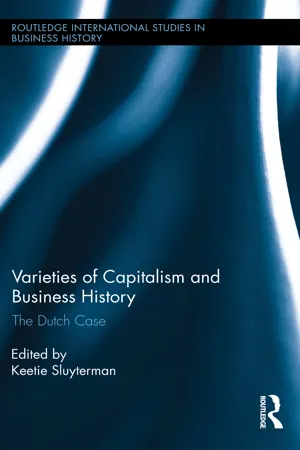
- 232 pages
- English
- ePUB (mobile friendly)
- Available on iOS & Android
About this book
The financial crisis of 2008 brought new urgency to the question how best to organise national economies. This volume gives a business history perspective on the Varieties of Capitalism debate and considers the respective merits of the liberal and coordinated market economies. It looks at individual firms and business people as well as institutions and takes a long-term perspective by covering the whole 20th century. The authors examine both continuity and change with a particular focus on the Netherlands, a nation with an open economy, situated between two countries that oppose each other in the way they organize their economies: Germany and Great Britain. The Netherlands also provides an important case study with Dutch business maintaining strong links to the United States, widely considered to be the 'typical' liberal market economy.
Contributors address the main topics of the capitalism debate, including labour relations, corporate governance, the firm and its leaders, coordination between firms, innovation, multinationals as agents of change, and economic performance. They show that the Netherlands moved from a mostly liberal market economy before 1914 towards a coordinated market economy from the 1930s onwards, and – up to a certain extent – back again to a more liberal market economy. Under both varieties of capitalism the country experienced economic growth and stagnation, but a more equal division of wealth occurred in the coordinated market economy only. Wars and international economic crises offered moments for revaluation and changes of tack.
This book raises questions for every country around the globe: How is change being brought about? Can one see different results from a liberal or a more coordinated market economy? And most critically: which system is more effective in bringing prosperity and enabling enough people to share in the wealth?
Frequently asked questions
- Essential is ideal for learners and professionals who enjoy exploring a wide range of subjects. Access the Essential Library with 800,000+ trusted titles and best-sellers across business, personal growth, and the humanities. Includes unlimited reading time and Standard Read Aloud voice.
- Complete: Perfect for advanced learners and researchers needing full, unrestricted access. Unlock 1.4M+ books across hundreds of subjects, including academic and specialized titles. The Complete Plan also includes advanced features like Premium Read Aloud and Research Assistant.
Please note we cannot support devices running on iOS 13 and Android 7 or earlier. Learn more about using the app.
Information
Table of contents
- Cover
- Title
- Copyright
- Contents
- List of Tables
- List of Figures
- Acknowledgements
- 1 Introduction: Varieties of Capitalism and Business History: The Dutch Case
- 2 Variations of Coordination: Labour Relations in the Netherlands
- 3 The Evolving Role of Shareholders in Dutch Corporate Governance, 1900‒2010
- 4 An Entrepreneurial Perspective: Varieties of Capitalism and Entrepreneurs in the 20th Century
- 5 Competition and Varieties of Coordination
- 6 The Dutch Knowledge Infrastructure and Institutional Change
- 7 Multinationals as Agents of Change
- 8 The Performance of the Dutch Business System
- 9 Dutch Changing Capitalism in International Perspective
- Contributors
- Index